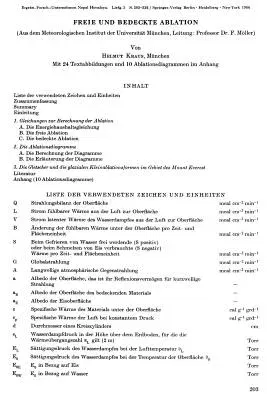Free and covered ablation. The ablation of ice that is either free and
open to the air or covered with other materials (with sand, rubble or
boulders; on glaciers with moraines) comes to pass by physical
processes, that can be described by equations. The amount of the
ablation can be caleu- lated, but depends on so many parameters, that it
is not possible to show all connections of the ablation processes in one
single diagram. Therefore in chapter 2 and in the appendix many dia-
grams are shown, that represent the dependence of the ablation on the
different meteorological factors and-in case uf eovered ablation-on the
heat transmission cueffieient of the covering mate- rial. The
differences between free and covered ablation become especially clear.
From these dia- grams, too, one can take the amounts of selective
ablation that is caused by other processes than by the difference in the
eovering. By using the equation uf energy balance it is possible to
inter- prete these processes. The third chapter shows many illustrations
about the glaciers and the small glacial forms of ablation in the
environs of the Mt. Everest. The phenomenons shown on these photographs
be- come intelligible by the physical considcrations ofthc first and the
second chapter. EINLEITUNG Die Abtragung von Schnee und Eis nennt man
Ablation; sie erfolgt vor allem durch Schmelzen und Verdunsten.


